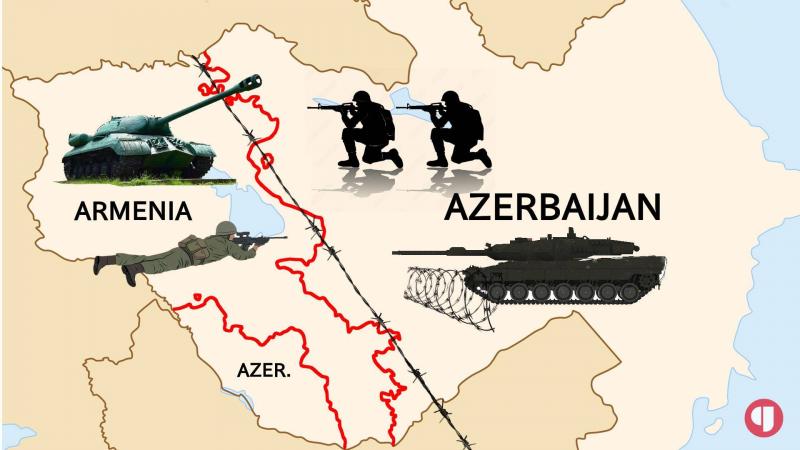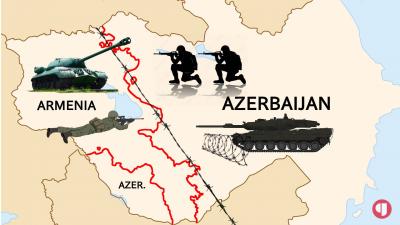The conflict between Armenia and Azerbaijan over the Nagorno-Karabakh region is not new; it dates back to before the Soviet Union, beginning after both nations gained independence from the Russian Empire in May 1918 over territories they each claim, notably the Nagorno-Karabakh region. Tensions heightened when Soviet leader Joseph Stalin granted the area to Azerbaijan, and even more so when the region unilaterally declared independence following the collapse of the Soviet Union.
Located within Azerbaijani territory, Nagorno-Karabakh covers approximately 4,800 square kilometers, with a predominantly Armenian population alongside Azerbaijani citizens and a Kurdish minority who were displaced following Armenian military control of the area. The word "Nagorno" in Russian means highlands, and "Karabakh" means black garden, thus the name translates to "highlands of the black garden." Armenians refer to the region as "Artsakh," meaning "forest of the god "Ar," or "sun god" in ancient Armenian, while Azerbaijanis call it "Yukhari Karabakh," which also means "highlands of the black garden."
### How the Conflict Began in Nagorno-Karabakh
The conflict dates back to the end of the Soviet Union when this region was part of the Soviet Socialist Republic of Azerbaijan, although it had a majority Armenian population. In 1988, bloody clashes erupted between Armenians and Azerbaijanis, prompting Armenian local authorities to announce their intention to withdraw from Azerbaijan and integrate into Soviet Armenia. However, Baku (the capital of Azerbaijan) rejected this, leading to armed conflict. In 1991, the residents of Nagorno-Karabakh declared their independent republic through a referendum, according to the legal norms of the Soviet Union at the time. Thus, Soviet Azerbaijani territory split into two independent states: the Republic of Nagorno-Karabakh and the Republic of Azerbaijan.
In 1994, Russia sought a ceasefire, leading to a standoff that resulted in 30,000 fatalities and the displacement of one million people from both sides. All Azerbaijanis were expelled from Nagorno-Karabakh, and a significant number of Armenians were forced to leave Azerbaijan. Since 1994, Armenia has controlled not only Karabakh (about 5,000 km²) but also seven regions within Azerbaijan known as the occupied territories (approximately 6,500 km²).
The status quo between Azerbaijan and Armenia over Karabakh has persisted, often referred to as a situation of "no war, no peace," with negotiations mediated by Russia, the United States, and France through the so-called "Minsk Group," established in 1992 under the Organization for Security and Cooperation in Europe, consisting of 56 member states including Russia, the United States, and all Western European countries, along with all former Soviet republics.
The conflict over Nagorno-Karabakh is considered a local dispute, yet it fits within a larger regional and international context, involving Turkey, Russia, Iran, and the United States as influential players.
### International Positions
Turkey has promptly voiced its support for Azerbaijan amid escalations, with President Recep Tayyip Erdoğan confirming Turkey's backing of Azerbaijan's actions to maintain its territorial integrity. He indicated that Azerbaijan's recent military victory in Nagorno-Karabakh opens a window of opportunity for regional normalization. Erdoğan hopes Armenia will take sincere steps to seize this opportunity for stability and peace in the region.
Turkey's support for Azerbaijan is rooted in a complex web of ethnic, religious, economic, and political factors since Azerbaijanis share Turkish ethnicity and language, alongside a religious linkage, despite most Azerbaijanis being Shia Muslims. Furthermore, Turkey sees Azerbaijan as a gateway to Central Asian countries, known as the Turkic republics, several of which have Turkish roots. The robust economic relationship between Turkey and Azerbaijan, particularly in natural gas exports, makes Azerbaijan pivotal for Turkey, which seeks to reduce its reliance on Russian and Iranian gas.
Conversely, historical animosities between Turkey and Armenia, notably stemming from the events of 1915 and the Armenian genocide, are significant as Armenia and its diaspora seek to label the events as a "holocaust," which affects Turkish support for Azerbaijan.
Russia views the Caucasus as a strategic depth it cannot afford to lose in terms of stability and security. Nonetheless, Armenia is also regarded as a strategic partner politically, militarily, and economically. Russia has reiterated its role as a security guarantor in the South Caucasus, acknowledging Turkey's influence in the Nagorno-Karabakh situation as a factor for reconciliation in the region.
Despite Russia's assertions of neutrality, historical bias towards Armenia is evident as it was the main arms supplier to Armenia during the conflict from 1992 to 1994. Russia is also intent on curbing Turkey's influence in the Caucasus and severing its connections with the Turkic republics in Central Asia.
### Recent Developments
On September 19, Azerbaijan announced the commencement of "anti-terror operations" targeting Armenian forces in the contested Nagorno-Karabakh region, following the death of six Azerbaijani citizens in separate landmine explosions. Azerbaijan claimed to have gained control of over 60 Armenian military sites.
The Azerbaijani Ministry of Defense stated operations target military personnel, ensuring civilians and civilian infrastructure are not harmed. Meanwhile, Armenia denied any military presence in the region, claiming thousands of Armenians have been forced to flee due to the ongoing conflict.
Following Azerbaijan's military success, more than half of Nagorno-Karabakh's Armenian population, previously estimated at 120,000, has fled to Armenia. Over 65,036 individuals have crossed into Armenia. The unrecognized president of the Karabakh Republic issued a decree to dissolve all government institutions by January 1, 2024, stating the Republic of Karabakh will cease to exist.
As tensions continue, the situation remains precarious with implications for regional stability.




